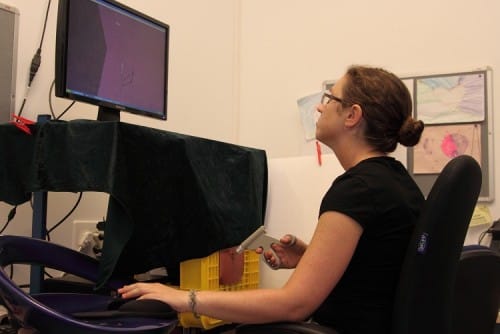Ben-Gurion University researchers found substantial differences between expert users and novice users in their perception of sensation in laparoscopy * The findings may help in the development of training techniques for surgeons

A new study improves the understanding of the effects of distortions in the sensory information transmitted during minimally invasive surgery (MIS). Also, the study reveals substantial differences in perceptual and motor strategies used by the experts.
In laparoscopy, which is a type of minimally invasive surgery, the surgeon works with elongated instruments that are inserted into the patient's body through a small incision in the abdominal wall. Reduction of blood loss, pain, complications, hospitalization time and scars - these are just some of the examples of the huge advantages of minimally invasive surgery over the traditional "open surgery". However, when surgeons perform surgical maneuvers using a laparoscope, they face various challenges due to the "fulcrum effect" created at the point of entry into the body. These challenges include reversing and multiplying movements and different forces (similar to what happens when children use a swing on the playground). So far, how the fulcrum changes the movement of the surgeons has been extensively studied, but the sensory perception through the laparoscopic device has not received much attention from the researchers.
The research, which was carried out under the auspices of the Israel United States Binational Foundation (BSF), is the result of a collaboration between Dr. Ilana Nisky and Dr. Amir Karniel from the Department of Biomedical Engineering at Ben-Gurion University, and the student Amit Milstein, who is doing the final project under their guidance his bachelor's degree in biomedical engineering, Prof. Sandro Musa-Ivaldi and Dr. Felix Huang from the Rehabilitation Institute of Chicago (RIC), and Prof. Carla Fogg, a surgeon and researcher from Northwestern University.
Dr. Nisky, who led the research under the direction of Dr. Karniel, explains: "The sense of touch includes everything related to the sense of touch: a sense of forces, textures, humidity, temperature, and more. We chose to focus on the feeling of forces, and examined in the study the effect of the "fulcrum" effect on the surgeon's perception of the stiffness of the tissue. In order to systematically study the effect, we connected a mechanical simulator (a box with a hole into which a model of a laparoscopic device was inserted) to a sensory device, which is a robotic system in which forces can be generated as a function of the position of the end of the robotic arm). The participants in the experiment we conducted came into contact with pairs of virtual tissues using this system and were then asked to answer which of the tissues felt more rigid. Based on the subjects' answers in the different experimental conditions, we calculated the bias in perception caused by the 'fulcrum effect'."
Two groups of subjects participated in the experiment: the "beginners" group was composed of a heterogeneous group of students from Ben-Gurion University. The "feeling experts" group was made up of robotics students from the Computational Motion Control Laboratory at Ben-Gurion University, who regularly work with robotic systems that produce a sense of touch. Dr. Nisky concludes: "We found that the perception of stiffness in the 'beginners' group was biased due to the fulcrum effect. It is interesting to note that the 'feeling experts' were influenced by this bias to a much lesser extent." According to her, these findings may help in the development of training techniques for surgeons in the future and can also contribute to improving surgical results.
Dr. Nisky is a graduate of the Department of Biomedical Engineering at Ben-Gurion University, where she obtained her bachelor's, master's and master's degrees and is currently in postdoctoral research at Stanford University in California.
The research will be presented at the MMVR19/NextMed conference, which will take place between February 9-11 in the city of Newport Beach in the state of California, United States.
See the full article.
For more details, you can contact Dr. Ilana Nisky,
Email nisky@stanford.edu
http://charm.stanford.edu/Main/IlanaNisky
Caption for photos:
